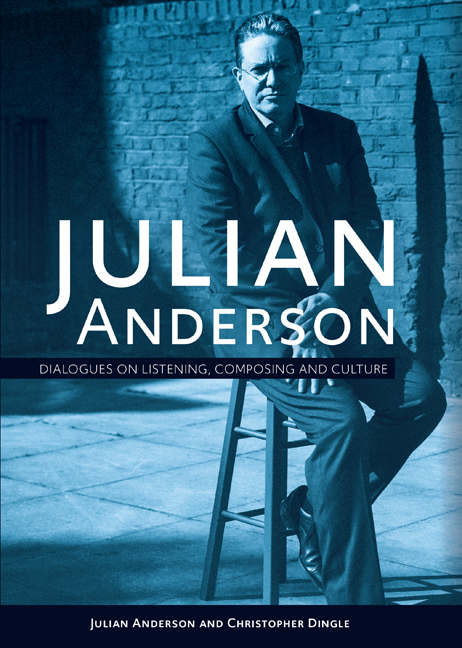Book contents
- Frontmatter
- Contents
- List of Illustrations
- Foreword
- Acknowledgements
- Introduction
- Prelude – Jeux: A Conversation Over Lunch
- Conversation One Origins
- Conversation Two Enthusiasms
- Conversation Three Training
- Conversation Four Dance
- Conversation Five Folk
- Conversation Six Composing (or Not)
- Conversation Seven Understandings
- Conversation Eight Beginnings (and Endings)
- Conversation Nine Puzzles
- Conversation Ten Singing
- Conversation Eleven Olly
- Conversation Twelve Memory
- Conversation Thirteen Opera
- Conversation Fourteen Practices
- Conversation Fifteen Outsiders?
- Conversation Sixteen Quartets
- Conversation Seventeen Advocacy
- Conversation Eighteen Partnerships
- Coda: Multiple Choices
- Chronology
- List of Personae
- Glossary of Musical Terms
- Macrotonality
- Catalogue of Published Works by Julian Anderson
- List of Recordings of Julian Anderson’s Music
- Bibliography
- Discography
- Index
Conversation Twelve - Memory
Published online by Cambridge University Press: 16 September 2020
- Frontmatter
- Contents
- List of Illustrations
- Foreword
- Acknowledgements
- Introduction
- Prelude – Jeux: A Conversation Over Lunch
- Conversation One Origins
- Conversation Two Enthusiasms
- Conversation Three Training
- Conversation Four Dance
- Conversation Five Folk
- Conversation Six Composing (or Not)
- Conversation Seven Understandings
- Conversation Eight Beginnings (and Endings)
- Conversation Nine Puzzles
- Conversation Ten Singing
- Conversation Eleven Olly
- Conversation Twelve Memory
- Conversation Thirteen Opera
- Conversation Fourteen Practices
- Conversation Fifteen Outsiders?
- Conversation Sixteen Quartets
- Conversation Seventeen Advocacy
- Conversation Eighteen Partnerships
- Coda: Multiple Choices
- Chronology
- List of Personae
- Glossary of Musical Terms
- Macrotonality
- Catalogue of Published Works by Julian Anderson
- List of Recordings of Julian Anderson’s Music
- Bibliography
- Discography
- Index
Summary
The first part of this conversation explores recording, starting with its fixed nature as an artefact and single recorded performances becoming synonymous with the work. The changing status of recordings, their use for discovering the music of other traditions and the relationship with the record in the fields of jazz and pop are all explored. The second part of the conversation is an extended exploration of Book of Hours, starting with how the sound of a needle on an LP has various connotations relating to the past, sparking some observations on change and redundancy in technology. The medieval sources of inspiration for Book of Hours are explored, followed by explanation of the opening material's roots in the beginner piano piece Old Bells, the surprise of the viola jig at the end and the influence of Flanders and Swann.
CD: When composers such as Stravinsky and Messiaen had their formative experiences, performance was completely ephemeral. By our generation, recordings had changed that relationship with music and performance. There has been plenty of evidence in our conversations of the profound benefits of recordings for discovering repertoire, but are there any dangers or frustrations for you as a composer, or simply as a lover of music?
JA: The trouble remains that recording still implies rigidity, whether it's a download, the physical object, or whatever. You press Play and hear that recording at the same speed, the same articulation and everything as it was before, and that is very misleading. Even with someone as precise as Boulez, I’m sure on a different day he might change his mind. I’ve been very fortunate to work with a number of really wonderful conductors, but I always want them to be free to do the music as they feel it. If I think something is wildly out of tempo, and they don't show any sign of changing, then the most I might say, and then only if asked, is that I was wondering about it. Most of the time, though, I’m very happy to let them take over and interpret the music accordingly. They’re called interpreters, after all – well please go ahead and interpret. I don't write a score to be played the same way every time. Stockhausen is one of the composers whose recorded legacy was meant to establish exactly how the music should go in every respect, no argument.
- Type
- Chapter
- Information
- Julian AndersonDialogues on Listening, Composing and Culture, pp. 225 - 246Publisher: Boydell & BrewerPrint publication year: 2020

